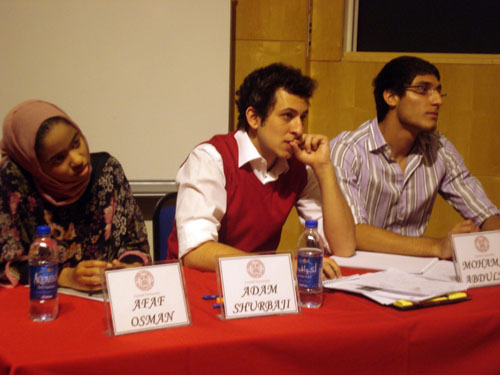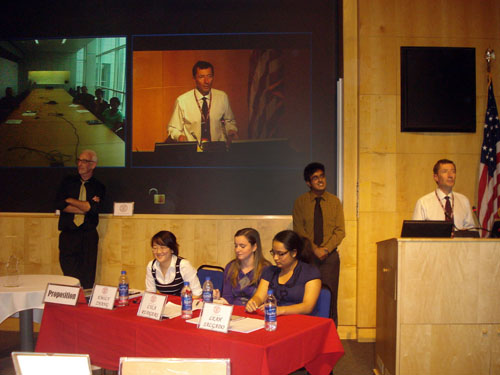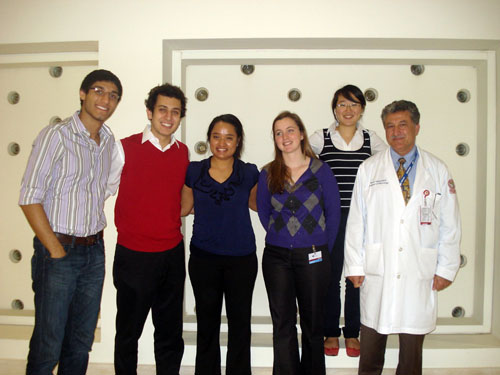WCMC-Q Hosts Inaugural Intercampus Debate
November 2009

WCMC-Q debaters strategize their responses to the Cornell
Ithaca team's proposition arguments on why tobacco should
not be a source of research funding.
Students, faculty and staff filled a WCMC-Q lecture hall recently to watch the first-ever Cornell intercampus debate. Three students from Ithaca, New York, flew in to debate three WCMC-Q medical students, who argued against the motion that “medical research institutions should not accept tobacco industry funding.”
“For the students, this event offers a welcome note of intercampus collegiality,” said Rodney Sharkey, PhD, professor of literature and debate coach at WCMC-Q. “Overall, it’s nice to have intercampus exchanges like this; they reinforce our shared objectives of quality education, which implies advanced skills in critical thinking.”
Faculty and students from the Ithaca campus also attended via live videoconference. Their presence, questions and comments aired in real time on the lecture hall’s screen. Debate judges—Ian Lacey from Carnegie Mellon University in Qatar, Kelley Bieringer of Qatar Debate, Dr. Pablo Del Pozo, professor of medical ethics at WCMC-Q, Dr. Basim Uthman, professor of neurology at WCMC-Q, and Jeffrey Harmon, academic assistant at WCMC-Q—received introductions before the debate as well.
Members of the WCMC-Q debate club were chosen before the event through a series of heats overseen by Sharkey—Afaf Osman, Mohamad Abdulhai, and Adam Shurbaji, all of the medical class of 2014, formed the opposition.
Representing Cornell, Ithaca, were Lyla Rudgers, an animal science major; Leah Salgado, an interdisciplinary studies major with an interest in rhetoric; and Emily Zhang, majoring in government, economics and French. They were chosen due to exceptional past performances and their upcoming participation in the world university debates competition.

Ian Lacy (far right) serves as judge of the event and announces
the winning team to a packed house in Doha as well as the
attendants in Ithaca.
“When we debate on a circuit in the states, it’s a very similar kind of debating style, and we implicitly agree upon principles,” said Zhang, “Whereas when you debate people from the other parts of the world, say, in the Middle East, opponents challenge certain things that we would find fundamental, and that debate gets onto a very different level.”
The debate lasted about 45 minutes. The Ithaca team’s main argument explored how tobacco companies might choose funding targets in a biased way to guard from negative stigma around cigarettes. WCMC-Q’s team relied most on the idea that funding, from any source, is beneficial for society and should not be turned away.
After the formal debate, the judges stepped out, and the floor opened for questions from the audiences in Doha and Ithaca. The debaters continued to answer and argue topics raised, yet everyone was left intrigued by one audience member who said their country’s main industry is tobacco, which is the sole source of funding for research therein.
“The cool thing about debate is that it forces you to look at things from a different perspective, in a different way, and I think that that’s one of the reasons why it’s such a valid activity,” said Salgado. “So you learn a lot more about different cultures and issues than you would normally. I think it gets rid of a lot of the stigma associated with areas of the world and with people from those areas.”

From left to right Mohamad Abdulhai, Adam Shurbaji, Leah
Salgado, Lyla Rudgers, Emily Zhang and Dr. Basim Uthman
gather for a group shot after the debate.
In the end, one team had to win. Lacey, who announced the winner, explained that the decision was tough, but that the proposition side, Ithaca, won. The team and supporters from WCMC-Q were presented with glass trophies before everyone attended the event’s catered reception.
Report by Emily Alp
Photos by Fatima Mahdi
